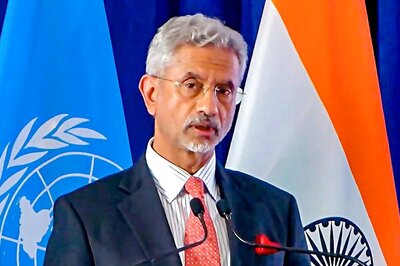
views
Johan Cruyff, one of football's greatest players and most influential and visionary coaches, died aged 68 on Thursday after a five-month battle with lung cancer.
The death of the Dutchman, whose creative genius on the pitch and inventive brilliance as a coach changed the modern game, prompted an outpouring of tributes to a figure hailed as doing more than anyone to "to make the beautiful game beautiful".
In his heyday in the early 1970s, Cruyff, slender, quick-witted and outrageously gifted, helped a generation of football fans across the world see the game in a different light.
Unquestionably the best player in the world in that period, he was voted three times winner of the prestigious Ballon d'Or so that he is now often mentioned alongside the pair widely considered the finest to have played the game, Pele and Diego Maradona.
Brazilian Pele said on Thursday: "Johan Cruyff was a great player and coach. He leaves a very important legacy for our family of football. We have lost a great man."
Maradona said: "We will never forget you, mate" while another Argentine Lionel Messi, the world's best current player, added: "Another legend has left us today."
Cruyff, who had announced last October that he was suffering from lung cancer, had said only last month that he was "2-0 up in the first half" of his battle against the disease.
Poignantly, that turned out to be one of the last public statements made by the sage whose observations on the modern game were eagerly courted in global football, with his weekly column for De Telegraaf newspaper a must-read until the end.
Cruyff died surrounded by his friends and family at his home in Barcelona, according to his official website.
The news prompted eulogies from his home country with Mark Rutte, the Dutch prime minister, saying: "The whole world knew him and, through him, the world knew the Netherlands."
The Netherlands' international against France on Friday in Amsterdam will be halted for a minute-long silence after 14 minutes in tribute to Cruyff, who wore the number 14 in his playing days.
In his adopted home of Barcelona, though, the loss was just as keenly felt with Cruyff having become an iconic figure in the Catalan city, where their current world-beating team, featuring Messi, still bears the hallmarks of his attacking invention.
As Pep Guardiola, one of his successful and influential successors as Barcelona coach, said: "He painted the chapel and Barcelona coaches since have merely restored or improved it."
TOTAL FOOTBALL
As a player with Ajax Amsterdam, Cruyff was the dazzling poster boy for the philosophy of "total football", embodied in coach Rinus Michels' magnificent Dutch team that he captained in his pomp to the 1974 World Cup final.
"Total football" centred on the idea of players being accomplished and comfortable enough on the ball to play anywhere -- and Cruyff, endlessly skilful and lightning fast in thought, was seen as the 'total footballer'.
It was during that World Cup in Germany that he treated a global audience for the first time to a magical piece of skill, dragging the ball behind his standing leg with the inside of his foot to bamboozle a Swedish defender. Thus was his monument, the "Cruyff turn", born.
Great players often do not make great coaches but Cruyff was a glorious exception, creating the Barcelona 'Dream Team' that won four straight Spanish titles and their first European Cup between 1991 and 1994.
Born Hendrik Johannes Cruyff, he joined Ajax as a long-haired teenager and inspired them to three successive European Cups between 1971-73 before joining Barcelona for a then world record transfer fee of $2.0 million and guiding them to the 1974 Spanish title.
He was the best player playing for the best team in the 1974 World Cup and, beyond Germany, there was huge disappointment worldwide that his brilliant Dutch side were beaten 2-1 in the final by the hosts after Cruyff had scored an early goal.
The Dutch also got to the World Cup final but lost again in 1978, this time without Cruyff who had quit the national side, saying years later he walked away after an armed kidnap attempt.
The possession-based playing style Cruyff promoted as Barcelona coach, with an emphasis on relentless attack, has been widely copied and is credited with underpinning Barca's subsequent successes, as well as those of the Spanish national team.
During his reign, Cruyff, who had been a heavy smoker, underwent double heart bypass surgery and subsequently gave up smoking, replacing his cigarettes for lollipops.
Former England captain Gary Lineker, who played under Cruyff during that period at Barcelona, summed up the Dutchman's towering contribution by saying on Twitter: "Football has lost a man who did more to make the beautiful game beautiful than anyone in history."




















Comments
0 comment